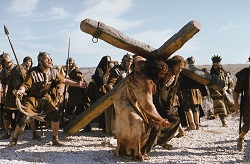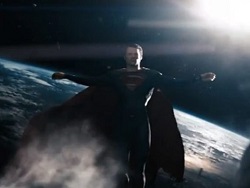SPOILERS AHEAD GET OVER IT
 Jesus and the movies have a complicated relationship. Hollywood doesn’t seem to know what to do with Him, and that’s an understatement. The best movie about Jesus ever made, The Passion of the Christ, was made by a man who was later revealed to be an anti-Semite. As a result, The Passion has been widely ignored in hindsight. Other incarnations of Jesus are stuffy and boring; none have come close to matching the combination of reverence, accuracy, and humanity that Mel Gibson conjured in The Passion. And when it comes to depicting the people who are supposed to represent Christ (Christians), they are most often portrayed in an overly simplified manner, either as crazy zealots or judgmental snobs.
Jesus and the movies have a complicated relationship. Hollywood doesn’t seem to know what to do with Him, and that’s an understatement. The best movie about Jesus ever made, The Passion of the Christ, was made by a man who was later revealed to be an anti-Semite. As a result, The Passion has been widely ignored in hindsight. Other incarnations of Jesus are stuffy and boring; none have come close to matching the combination of reverence, accuracy, and humanity that Mel Gibson conjured in The Passion. And when it comes to depicting the people who are supposed to represent Christ (Christians), they are most often portrayed in an overly simplified manner, either as crazy zealots or judgmental snobs.
The best handling of Jesus in the movies usually comes from subtle imagery and Christ-like characters. The directors who go this route understand that subtle artistic references are often more effective than direct depiction. These Christ references will usually come up in only one scene and disappear as quickly as they came. Some of my favorites include Walt’s outstretched arms as he sacrifices himself to forever change his neighbor’s life in Gran Torino; Peter’s crucifix mirroring as he is carried by the New Yorkers on the train after he saved their lives in Spider-Man 2; Harry Potter, Gandalf, and Aslan falling only to rise stronger to defeat the armies of their enemies. The directors that make use of these images also understand that we respond best to Christ substitutes that don’t beat us over the head. David Yates and Peter Jackson don’t use any overt imagery to link Harry and Gandalf to Christ; they represent Him through their circumstances and motives. That way, the metaphor isn’t lost on us, but we don’t have a lump on our cranium from it either.
 Two recent movies make use of the Christ image to lend weight to their characters’ decisions with varying results. One is Man of Steel, whose Superman is likened to Christ in several instances throughout the film. The other is Star Trek into Darkness, whose Captain Kirk is not compared to Jesus at any point, but whose heroic decisions near the end of the movie unmistakably bear certain Christ-like marks. One movie succeeded; the other failed miserably.
Two recent movies make use of the Christ image to lend weight to their characters’ decisions with varying results. One is Man of Steel, whose Superman is likened to Christ in several instances throughout the film. The other is Star Trek into Darkness, whose Captain Kirk is not compared to Jesus at any point, but whose heroic decisions near the end of the movie unmistakably bear certain Christ-like marks. One movie succeeded; the other failed miserably.
Star Trek into Darkness is a pop masterpiece, a kinetic force of action and witty banter that also manages to rise thematically above the other popcorn fare of the season by posing some interesting moral questions. Lost in all the critical musings on how this Star Trek hearkened back to Wrath of Khan (either boldly or foolishly, depending on your POV) was the fact that director J.J. Abrams slipped in a slick, emotional Christ metaphor. As the damage that Khan (Benedict Cumberbatch) inflicted on the Enterprise takes its toll, Captain Kirk (Chris Pine) moves to realign the ship’s core in an attempt to save his crew, effectively ending his own life. Spock (Zachary Quinto) makes it to his side just in time to watch him die in pain and in fear, but knowing that he did the right thing.
 Kirk’s actions are notable not only because they were the right and heroic thing to do, but because Kirk has been doubted much of the movie, by others and by himself, and this noble decision vindicates him. Some have claimed that the fact that he comes right back to life takes the emotion out of his death, but I don’t agree; both Kirk and Spock thought he was really dying when it happened. We knew he would be back, but that didn’t make the moment any less real between the characters. Furthermore, the movie makes it very clear that Kirk’s sacrifice was for the people he was saving; he died so that they might live. The choice by Abrams to draw such an obvious parallel to Christ without directly referencing it makes the death that much more poignant.
Kirk’s actions are notable not only because they were the right and heroic thing to do, but because Kirk has been doubted much of the movie, by others and by himself, and this noble decision vindicates him. Some have claimed that the fact that he comes right back to life takes the emotion out of his death, but I don’t agree; both Kirk and Spock thought he was really dying when it happened. We knew he would be back, but that didn’t make the moment any less real between the characters. Furthermore, the movie makes it very clear that Kirk’s sacrifice was for the people he was saving; he died so that they might live. The choice by Abrams to draw such an obvious parallel to Christ without directly referencing it makes the death that much more poignant.
Man of Steel is not a pop masterpiece. It’s tonally confused, with some questionable decisions regarding character motivation and imagery, not the least of which is the choice to purposefully liken Superman to Jesus Christ in several scenes. Trust me, this isn’t an accident. They make a point to designate Clark Kent as 33 years old, the same age Christ was when He was crucified for our sins. They also have him talking to a priest about His destiny with Christian imagery literally surrounding him. This is probably the most pointless and clichéd scene in the movie. And if that wasn’t on the nose enough, there’s talk the entire movie of him being the savior of two separate worlds.
 There’s nothing inherently wrong with any of these references, apart from the lack of subtlety. The problem comes when Superman doesn’t live into the role the filmmakers have forced upon him. Superman is actually the perfect character to function as an arrow to Christ; he’s superhuman, he wants to live selflessly, and he wants to save humanity. But the filmmakers have him show an uncharacteristic disregard for life as he destroys building after building during his fights with the other Kryptonians. Surely he would see that the damage he is causing is killing human beings. Other incarnations of Superman would have moved the fight away from civilization. This inanity is compounded by the choice the filmmakers have him make at the end of the movie- you know, the big one where he kills someone. I’m sure they want us to think that Clark had no choice but to kill Zod in order to save the family he was threatening. But why set Supes up as a Christ figure and then have him kill the bad guy? This was a prime moment to have Superman sacrifice himself and do his best to offer Zod redemption. Instead, he snaps Zod’s neck (which, by the way, was an extremely lame death for Michael Shannon’s villain). Heck, Superman could have put his hand over Zod’s eyes at the very least. Beyond the fact that the decision makes no sense logically, it doesn’t jibe at all with their decision to make him a Christ figure.
There’s nothing inherently wrong with any of these references, apart from the lack of subtlety. The problem comes when Superman doesn’t live into the role the filmmakers have forced upon him. Superman is actually the perfect character to function as an arrow to Christ; he’s superhuman, he wants to live selflessly, and he wants to save humanity. But the filmmakers have him show an uncharacteristic disregard for life as he destroys building after building during his fights with the other Kryptonians. Surely he would see that the damage he is causing is killing human beings. Other incarnations of Superman would have moved the fight away from civilization. This inanity is compounded by the choice the filmmakers have him make at the end of the movie- you know, the big one where he kills someone. I’m sure they want us to think that Clark had no choice but to kill Zod in order to save the family he was threatening. But why set Supes up as a Christ figure and then have him kill the bad guy? This was a prime moment to have Superman sacrifice himself and do his best to offer Zod redemption. Instead, he snaps Zod’s neck (which, by the way, was an extremely lame death for Michael Shannon’s villain). Heck, Superman could have put his hand over Zod’s eyes at the very least. Beyond the fact that the decision makes no sense logically, it doesn’t jibe at all with their decision to make him a Christ figure.
I don’t think all of this makes Man of Steel a bad movie. On the contrary, when I first saw it, I enjoyed it, especially the action scenes. Henry Cavill makes a charming Superman, and Amy Adams’s Lois Lane was a good foil for him. I just think that they bungled the Christ metaphor. And if there’s one metaphor I don’t want you to bungle, it’s the Christ one. Captain Kirk makes a far more effective vessel for Christ imagery; he’s a man in need of redemption, but he ends up giving up himself to provide salvation for others. Hollywood mishandles Christ all the time; it’s nice to see someone get Him right.